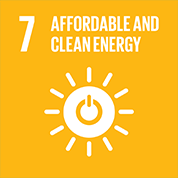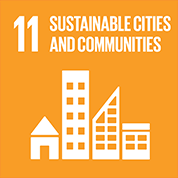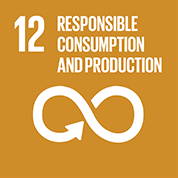Avoid
The first step to reducing our negative impact on the environment is to reduce our greenhouse gas emissions from the outset. This covers all parts of everyday life at the University, including our electricity and gas consumption, procurement, travel, food, water consumption, waste and more. The University works to deliver this within the institution but also the wider community through our academic work.
Energy
 The seventh Sustainable Development Goal is to provide universal access to modern energy for all and to increase the amount of renewable energy used globally.
The seventh Sustainable Development Goal is to provide universal access to modern energy for all and to increase the amount of renewable energy used globally.
University operations
The University has already reduced its emissions through its Carbon Management Plan. We have achieved our 2020 target to reduce absolute carbon emissions by 25%. For three consecutive years, in recognition of our commitment to saving carbon, the University has been awarded triple gold Carbon Saver Standard for carbon, waste and water reductions.
As part of our Change for the Better campaign, we are running the Be Chilled Freezer Project. This aims to target our usage of freezers in order to help lower our carbon emissions. We take pride in our scientific research, but our science buildings are our largest consumer of energy and refrigeration and account for 20-30% of electricity energy. We will reduce this by 900 tonnes CO2 over 5 years.
Research
Since the 1980s, the University has been researching into energy efficiency and renewable energy and this continues today in different forms. Situated in the Leicester Law School, the Centre for Consumers and Essential Services combines legal and social policy expertise to explore the effects for consumers of regulation and provision of essential services, such as energy. A number of academics, in the School of Mathematics and Actuarial Science, are exploring the relationship between energy mix, carbon emissions reduction pathways and the impact on the economy more widely.
Travel
 The eleventh Sustainable Development Goal is to reduce the environmental impact of cities by travel, air quality and waste management.
The eleventh Sustainable Development Goal is to reduce the environmental impact of cities by travel, air quality and waste management.
University operations
The University has a travel plan that aims to reduce the amount of commuting by single occupancy vehicles and lower the emission emitted by commuting. We have already reduced single occupancy vehicle commuting to only 40%.
Research
Together with the NCEO (National Centre for Earth Observation), the University of Leicester offers a radical set of solutions to air quality and user information systems using expert knowledge in chemistry, physics, intelligent data and disruptive technologies. Collaboratively with industrial partners, researchers have developed an integrated air quality and traffic management system (u-TRAQ), enabling real-time adjustment of traffic management strategies, to minimise pollutant impact across a city.
Responsible consumption and production
 The twelfth Sustainable Development Goal includes promoting responsible consumption and production in all aspects of life, for example in procurement and waste. One target aims to ensure that people everywhere have knowledge and understanding of sustainable lifestyles, which should be adopted, and to live cohesively with nature rather than in ways which deplete resources.
The twelfth Sustainable Development Goal includes promoting responsible consumption and production in all aspects of life, for example in procurement and waste. One target aims to ensure that people everywhere have knowledge and understanding of sustainable lifestyles, which should be adopted, and to live cohesively with nature rather than in ways which deplete resources.
University operations
The WasteLeics Behaviour Change campaign was launched in summer 2019. The campaign aims to encourage staff and students to be more responsible in their consumption during everyday life. Over the first few months of the campaign, the amount of waste recycled increased from 23.5% to 36.9% compared with the same period in 2018.
Research
The Centre for Critical and Creative Geographies draws together social science, geohumanities and critical GIS research at Leicester. One of the three overlapping research themes is Environmental Governance and Social Justice which researches into how people encounter, understand and value the environment, including environmental change, poverty and food and energy insecurities.
Policies and planning for climate change
 The thirteenth Sustainable Development Goal’s targets involve building knowledge and capacity to meet climate change and integrating climate change measures into policies and planning.
The thirteenth Sustainable Development Goal’s targets involve building knowledge and capacity to meet climate change and integrating climate change measures into policies and planning.
University operations
With a constantly evolving campus, we need to ensure that the design and management of our buildings have low environmental impact. Our George Davies Centre is the UK’s largest non-residential Passivhaus project. Built to the ultra-energy efficient Passivhaus standard, it achieved a DEC ‘A’ rating in its first recorded year. To ensure future projects are sustainable, we have sustainable construction design guides, including a Biodiversity Design Guide.
The University’s Climate Change Strategy was developed to ensure that we help deliver solutions and avoid causing more damage through our operations and academic work.
Research
Our academics are addressing the issue of climate change and what measures we can take. In the Crustal Processes Research Group, researchers are exploring the possibilities about carbon capture and storage, for example investigating the potential of ultrabasic rocks to sequester large masses of carbon. Academics use Earth Observation methods to gather data to tackle today’s greatest challenges, such as climate change and air pollution. Rocio Barrio Guillo, a PhD student in the School of Physics, focuses on detecting and quantifying methane emissions at a local scale to verify inventories that will feed into policies. The Centre for Landscape and Climate Research addresses environmental problems of land and vegetation by analysing the changing of land use and interactions between water cycles and ecosystems.